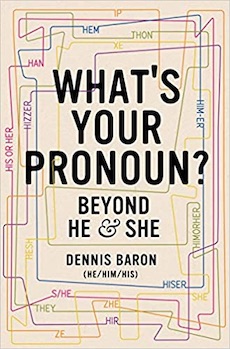By D.T. Siebert
Professor Baron’s title refers to the growing sensitivity to nonbinary gender identity and the trend of identifying what pronoun we prefer—whether “he him his,” “she her hers,” “they them their,” or a set of newly created pronouns. The basic problem is, of course, that the English language has no gender-neutral singular pronoun, and the traditional use of the masculine pronoun as gender-inclusive—once the rule—has become almost unacceptable.
Take the examples Baron offers: “Everyone forgets his passwords” or (… their passwords) or (… his or her passwords) or (… her passwords) or (… its passwords) or (… everyone’s passwords) or (… one’s password) or (… thons passwords)—the last featuring an invented new pronoun. He critiques each choice on its acceptability, arguing that the increasingly accepted plural “their” is the best choice, despite its violation of the old rule that a singular subject requires a singular pronoun. Actually, the choice of “their” is almost a fait accompli. Descriptive usage, what most educated people will accept and use today, trumps prescriptive usage, what the old rules of grammar dictate. But besides the current acceptance of “their,” Baron makes a good linguistic argument defending the choice.
In many cases this problem of choice can be avoided simply by changing from the singular to the plural—from “Everyone forgets his passwords” to “All people forget their passwords.”
Baron points out that another pronoun, “you,” has long been accepted as both a singular and a plural since the time “thou” became archaic centuries ago. The choice between “thou” and “you” once also signaled the distinction between familiar address (“thou”) and the formal (“you”). Thus today we address one person with “you are,” even though some speakers well into the 18th century might have said “you was.” But using “you” for both the singular and plural introduces problems as well. English speakers often sense that “you” seems more singular than plural. Thus English speakers often make the plural “you” clearer by saying something like “you people,” “you all,” “y’all,” “you guys,” “youse,” or even “you’uns.”
A living language is always changing, despite efforts to label certain words or phrases as “incorrect.” Strict prescriptivists labor in vain to police the many scofflaws of grammar rules. After all, these “rules” have not been engraved on tablets from on high, but rather are mere human inventions, often without any justifiable reason for the rule. For example, one can split an infinitive without sinning. To do so is natural to English and often even clearer in meaning. Which is better: “truly to believe” or “to believe truly” or “to truly believe”?—the last one of course, despite the split between “to” and “believe.” Then why the rule? Because it’s not done in Latin? But the Latin infinitive can’t be split because it’s one word. Esse in Latin; to be in English.
Or take these three questions: “To whom were you speaking?” or “Whom were you speaking to?” or “Who were you speaking to?” Most people would choose the third, especially in conversation. Today, the inflection “whom” is becoming practically archaic.
All in all, Baron’s book is interesting and important, certainly in showcasing this quandary about English’s missing gender-neutral pronoun. Despite the attempted pun, a reader might be taken aback by Baron’s initial claim that “Pronouns are suddenly sexy.” “Sexy” is a sexy word—seemingly describing anything exciting, glamorous, and desirable—but, I doubt, pronouns.
D.T. Siebert (ΦBK, University of Oklahoma) is Distinguished Professor Emeritus of English Literature at the University of South Carolina, Columbia.




